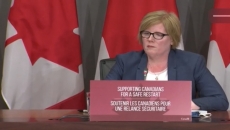A senior Bank of Canada official says that many Canadians believe that official inflation measures don't reflect the rising costs they face.
Deputy governor Lawrence Schembri said Tuesday the gap between perception and reality has become more pronounced during the COVID-19 pandemic.
Some of that may have to do with changes in consumption patterns as Canadians spend less on things like gasoline where prices are falling, and more on things like groceries where prices have gone up.
In a speech to the Canadian Association for Business Economics, Schembri said the perception gap on prices holds significant implications for the central bank, which for three decades has targeted an annual inflation rate of two per cent.
The comfort zone the bank sets for its inflation target helps determine what happens to its key policy interest rate, which can affect the rates charged for mortgages and loans.
Schembri said public trust and understanding are important factors for any policy actions the central bank takes to keep prices and by extension the economy stable.
"It's more than just a number. Achieving our target on a continuing basis contributes to rising standards of living for all Canadians," he said, according to the prepared text of his speech.
"When people and businesses feel confident that they know what the rate of inflation will be, they can make better long-range plans for their careers, their savings and their investments."
The central bank is in the midst of a review of the inflation target framework before renewing its agreement with the federal government for the next five years, just as it has done since the early 1990s.
The central bank may choose a different method altogether, given how Statistics Canada's consumer price index has been shaken by a shift in spending habits during the pandemic. Statistics Canada, which calculates the index by measuring prices on hundreds of goods and services, has found that people are spending less on things that factor more into the inflation reading, like gasoline, and more on things that have a smaller effect.
Research the bank has conducted with Statistics Canada during the pandemic has suggested that price increases are close to official inflation readings even when accounting for differences in purchasing based on household makeup, income level, education, age, and renters versus owners, Schembri says.
Another issue that may be at play to explain the gap in perception versus measurement is that consumers don't factor improvements in things like electronics even as prices go up, he says, or that they base more of their perception on the rising cost of housing that has risen sharply in cities like Toronto and Vancouver in recent years.
Schembri said the central bank must communicate often, clearly and consistently to a broad audience to better influence expectations about prices and maintain its own credibility.
"Our communications strategy must strive to explain inflation, our target and our policy to different audiences in a clear and accessible manner to deepen their understanding," the text of his speech reads.
"While we have benefited from having well-anchored inflation expectations in the past, this mooring will be tested by the very rough economic waters caused by the pandemic."






